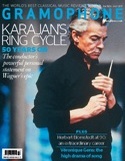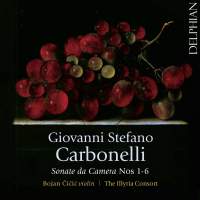Texte paru dans: / Appeared in: |
|
|
Outil de traduction (Très approximatif) |
|
|
Reviewer: Charlotte Gardner Of the crop of Italian violinist-composers who successfully made London their home in the early 18th century, Giovanni Stefano Carbonelli remains well below the radar in the 21st century. This isn’t altogether surprising when the sum total of his surviving compositions is a solitary set of 12 violin sonatas. His career path probably didn’t help: in the 1730s he switched from violinist to wine merchant. Still, if the number of surviving print copies of his violin sonatas is anything to go by then he clearly didn’t choose the vintner’s life because the violin-playing wasn’t working out. This theory is further backed up by the 1774 posthumous inventory of his violin collection, which listed not one but two Stainer violins (and Stradivarius had not yet superseded Stainer as the most sought-after maker) plus a Strad. Hats off then to Čičić and his Illyria Consort for choosing the first six of Carbonelli’s sonatas for their debut recording, because not only is half their programme’s music previously unrecorded, but it’s all genuinely wonderful stuff. Perhaps the most structurally striking elements of the sonatas are the fugal movements at the centre point of each; and given that the writing is not overtly flashy, Čičić’s easy, fluid perfection through their webs of double-stopped complexities merits mentioning. Likewise the way he smoothly brings off Carbonelli’s occasional ferociously unidiomatic modulations: listen to the Third Sonatas’s Adagio and know that the passage from 0'26" to 0'42" is in fact a C sharp minor double-sharp-filled killer, despite calm appearances. Add tonal colour spanning the gamut from satisfyingly wiry to full and sweet, and it’s a full house of deliciousness, all of which is bolstered further by the varied palette of continuo colour on display from Čičić’s Illyria Consort colleagues, Susanne Heinrich’s seven-string bass viol joined by either theorbo, archlute or baroque guitar from David Miller, and a combination of harpsichord and organ from Steven Devine. Really, bravo to the whole. |
|




